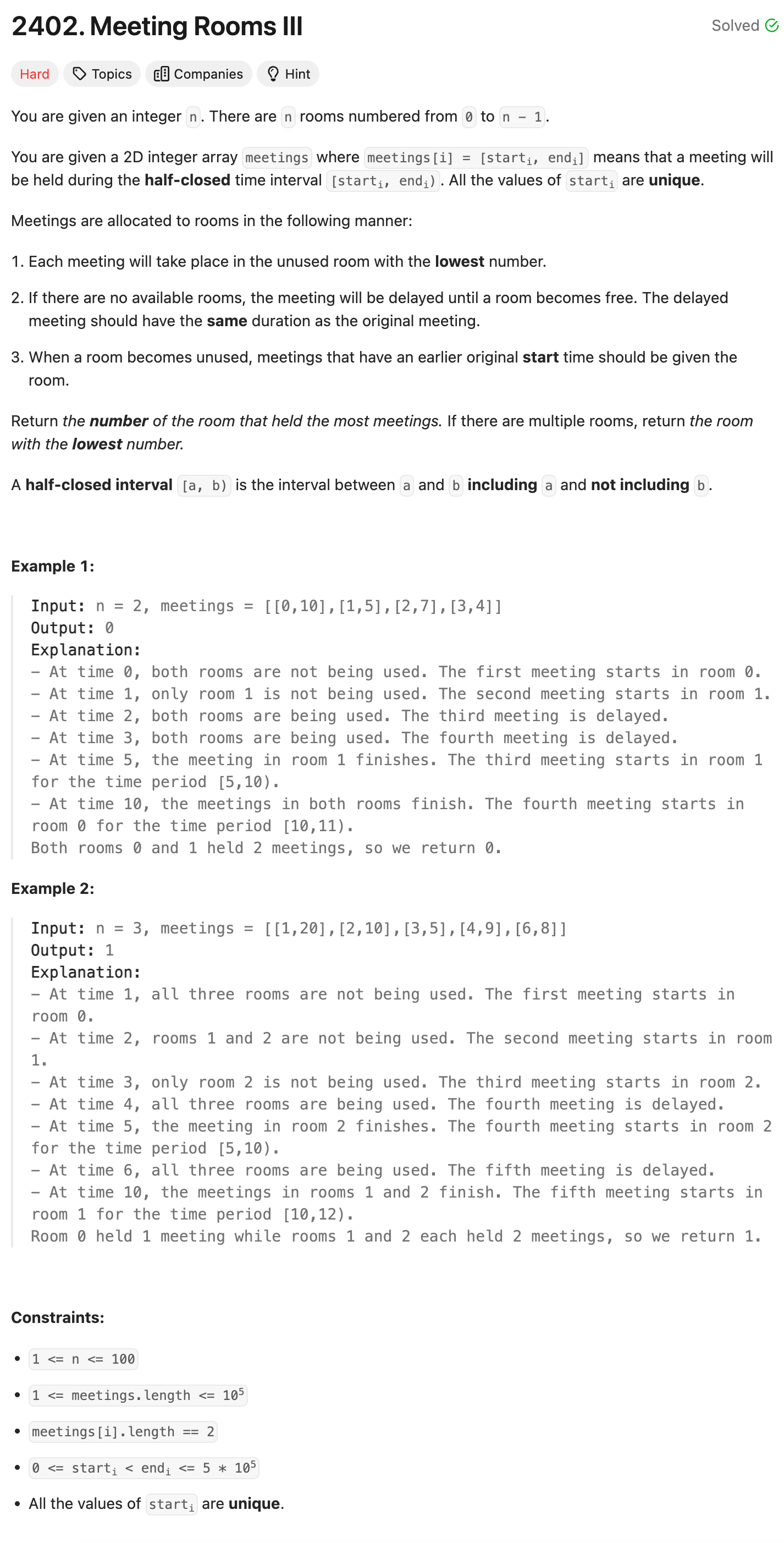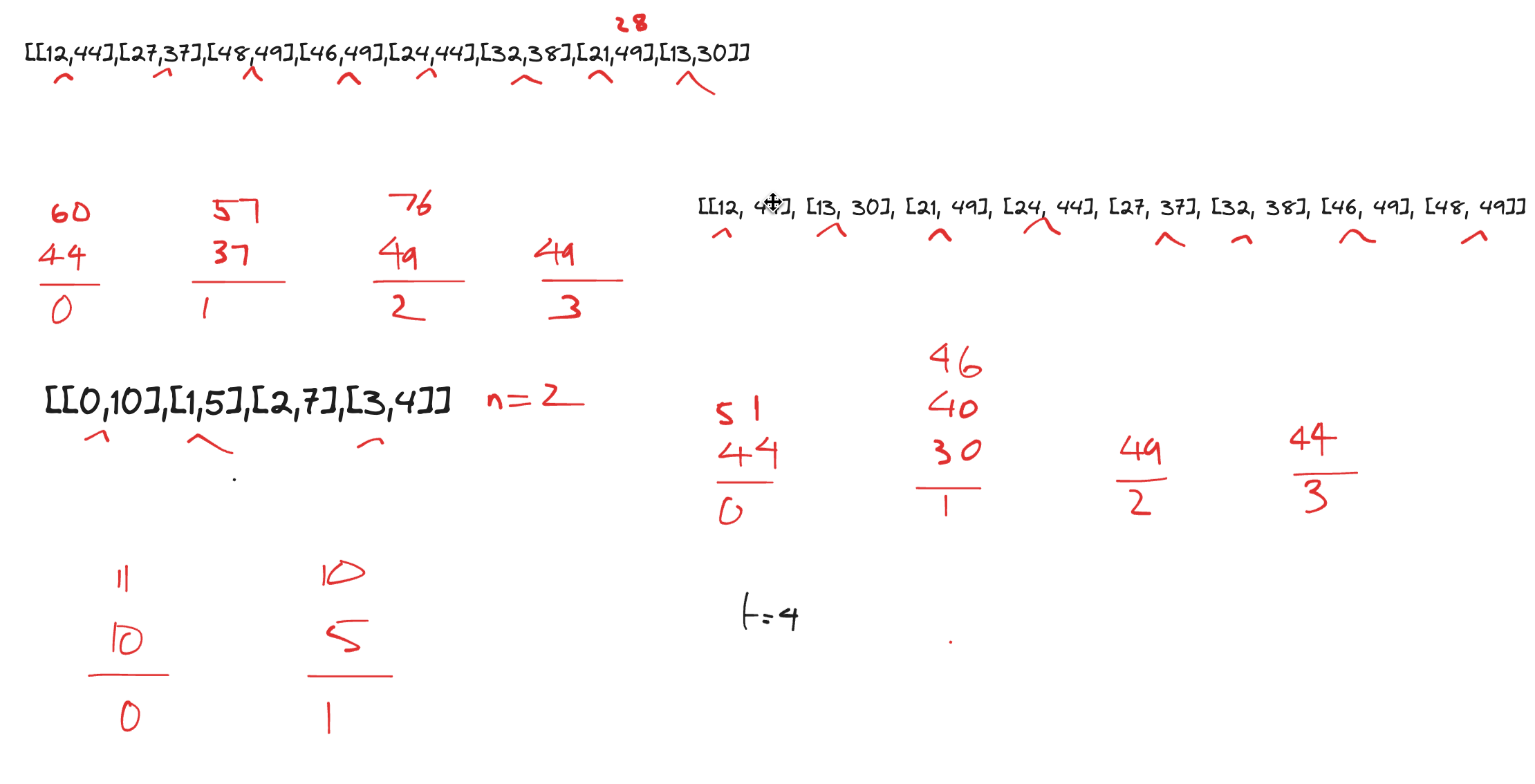Problem of The Day: Meeting Rooms III
Problem Statement
My note:
Intuition
The goal is to find the most booked room based on a list of meetings and their start and end times. I’ll need to organize the meetings and allocate them to rooms while minimizing the delays between consecutive meetings in the same room.
Approach
I’ll start by sorting the meetings based on their start times. Then, I’ll iterate through each meeting and try to find a suitable room for it. If a room is available, I’ll assign the meeting to that room; otherwise, I’ll check for the next available room.
To minimize delays, I’ll keep track of the end time of the last meeting in each room. If the current meeting can start immediately after the last one, I’ll assign it to the same room without any delay. Otherwise, I’ll add the necessary delay to the current meeting’s start time.
I’ll maintain a list of rooms, each represented as a list of meeting end times. After processing all meetings, I’ll count the number of meetings in each room and find the room with the maximum number of bookings.
Complexity
-
Time complexity: O(nlogn) due to the initial sorting of meetings, where n is the number of meetings.
-
Space complexity: O(n) for the list of rooms.
Code
class Solution:
def mostBooked(self, n: int, meetings: List[List[int]]) -> int:
meetings.sort()
rooms = [[] for _ in range(n)]
for i, meeting in enumerate(meetings):
start, end = meeting
available_room = [float('inf'), []]
for room in rooms:
if not room:
available_room[0] = end
available_room[1] = room
break
elif room and start >= room[-1]:
available_room[0] = room[-1]
available_room[1] = room
break
elif room and available_room[0] > room[-1]:
available_room[0] = room[-1]
available_room[1] = room
prev_end, curr = available_room
if not room:
curr.append(end)
else:
delays = prev_end - start if prev_end - start > 0 else 0
curr.append(end + delays)
rooms = list(map(len, rooms))
res = [0, 0]
for i, num_of_meetings in enumerate(rooms):
if res[0] < num_of_meetings:
res[0] = num_of_meetings
res[1] = i
return res[1]
Editorial Solution
Approach 1: Sorting and Counting
class Solution:
def mostBooked(self, n: int, meetings: List[List[int]]) -> int:
room_availability_time = [0] * n
meeting_count = [0] * n
for start, end in sorted(meetings):
min_room_availability_time = inf
min_available_time_room = 0
found_unused_room = False
for i in range(n):
if room_availability_time[i] <= start:
found_unused_room = True
meeting_count[i] += 1
room_availability_time[i] = end
break
if min_room_availability_time > room_availability_time[i]:
min_room_availability_time = room_availability_time[i]
min_available_time_room = i
if not found_unused_room:
room_availability_time[min_available_time_room] += end - start
meeting_count[min_available_time_room] += 1
return meeting_count.index(max(meeting_count))
Approach 2: Sorting, Counting using Priority Queues
class Solution:
def mostBooked(self, n: int, meetings: List[List[int]]) -> int:
unused_rooms, used_rooms = list(range(n)), []
heapify(unused_rooms)
meeting_count = [0] * n
for start, end in sorted(meetings):
while used_rooms and used_rooms[0][0] <= start:
_, room = heappop(used_rooms)
heappush(unused_rooms, room)
if unused_rooms:
room = heappop(unused_rooms)
heappush(used_rooms, [end, room])
else:
room_availability_time, room = heappop(used_rooms)
heappush(
used_rooms,
[room_availability_time + end - start, room]
)
meeting_count[room] += 1
return meeting_count.index(max(meeting_count))

